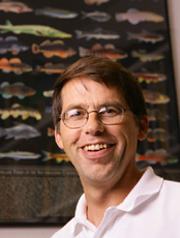
David Lodge, professor of biological sciences and director of the Center for Aquatic Conservation at the University of Notre Dame, is the lead organizer for a symposium on global trade and aquatic invasive species that will take place Friday (Feb. 13) during the 2009 American Association for Advancement of Science (AAAS) annual meeting in Chicago.
Titled “Global Trade and the ‘Homogecene:’ Lessons from the Great Lakes for the World,” the session will present recent advances in research on ship-borne aquatic invasive species in the Great Lakes and globally.
“Biological invasions are obliterating the very geographic patters of organisms that fueled Darwin’s and Wallace’s discovery of evolution,” Lodge said. “Some biologists already refer to this epoch as the ‘homogecene.’ Increased trade is bringing distant ecosystems into contact in new ways. Organisms are transported to unfamiliar settings that are conducive to invasion. These invasions cause biotic homogenization and economic damages that are costly and often impossible to reverse.”
Speakers at the symposium will reveal major new results from biology, economics and policy. They will discuss novel network models to inform management strategies, the first estimate of aggregate financial costs caused by ship-borne invasions in the Great Lakes, and an analysis of alternative policies to better balance competing uses of the Great Lakes.
Symposium sessions include “Shrinking Degrees of Separation Among World’s Ports,” by John Drake, Odum School of Ecology, University of Georgia (and a graduate of Notre Dame’s biological sciences doctoral program); “Invasion-induced Losses of Ecosystem Goods and Services in the Great Lakes,” by Lodge; and “Impact of Ship-borne Invasions in the Great Lakes Regional Economy,” by David Finnoff, Department of Economics and Finance, University of Wyoming.
Roger Cooke of Resources for the Future and Steven Popper of Rand Corporation, a co-organizer of the event, will address the policy implications of the symposium presentations in light of the newly released National Research Council study on balancing shipping and invasive species issues in the Great Lakes.
AAAS is the world’s largest scientific society and the publisher of the prestigious scientific journal Science.
Contact: David Lodge, professor of biological sciences and director, center for aquatic conservation, 574-631-6094, dlodge@nd.edu